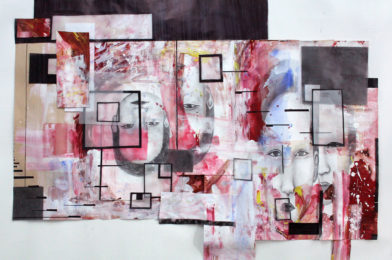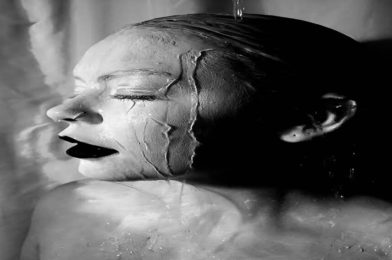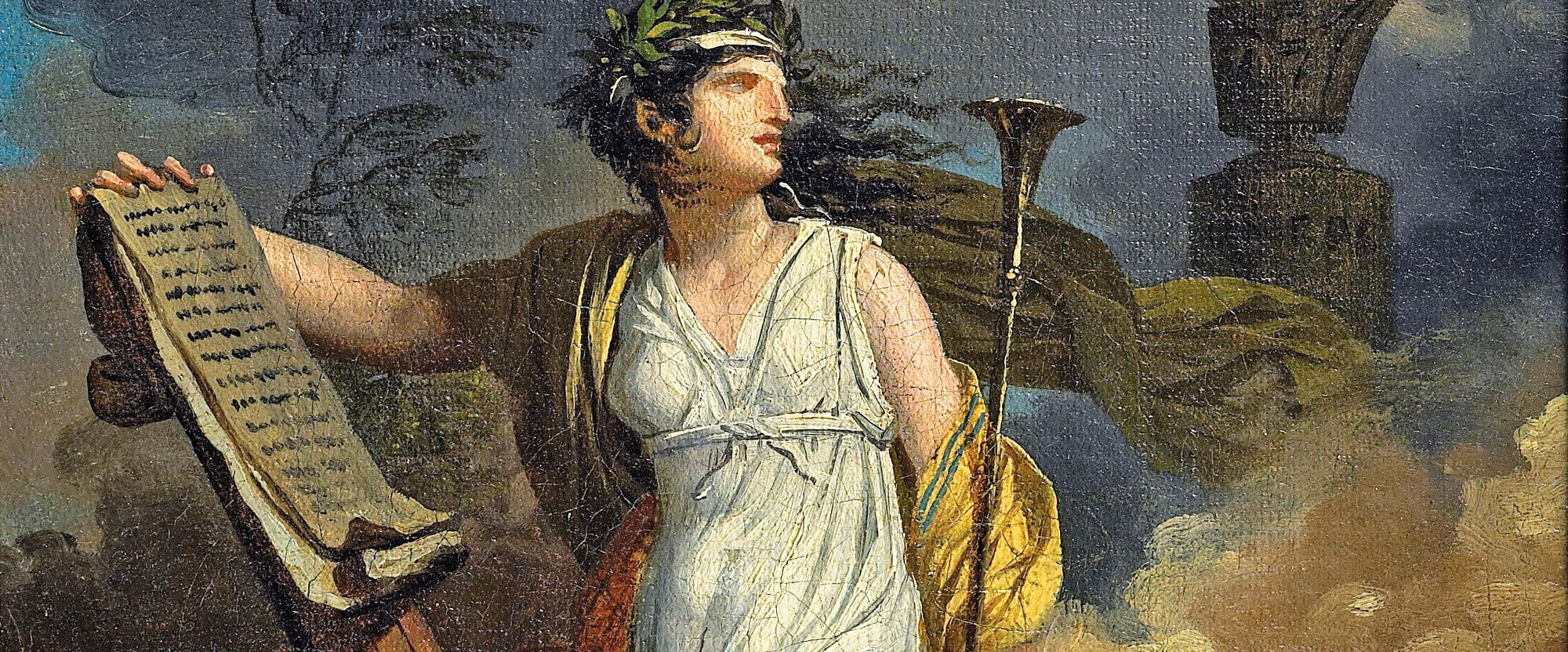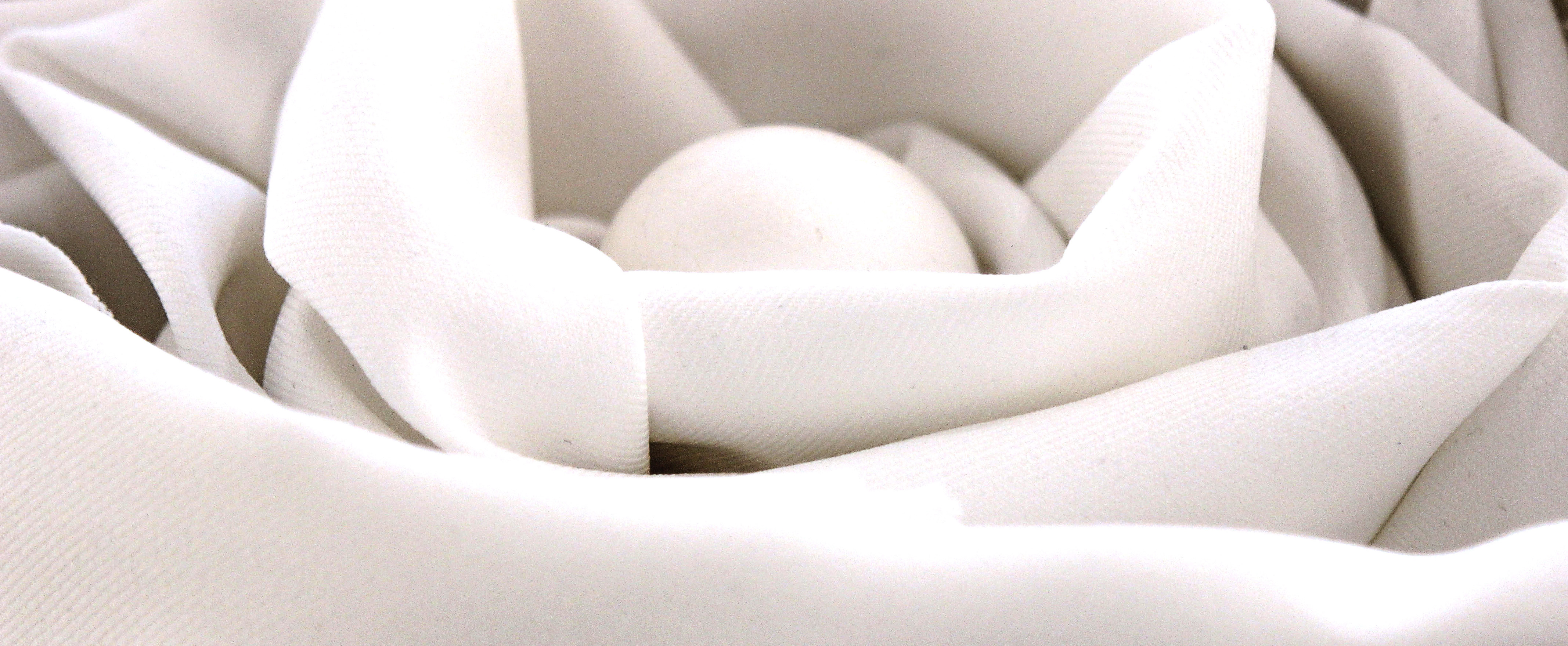On stage, NELLIE, a dead woman in her early twenties, is lying on an examination table covered, all except for her face, by a white sheet. The sheet acts as a dress, not coming off when she sits up, which she will do in the play. There is a table about 5-10 feet away that mirrors hers. It is empty and the light over it is off. NELLIE is made up to look very dead and cold. She does not appear mutilated; just embalmed. The man standing over her- CALVIN- is a coroner in his early fifties. He looks tired and bored. He is holding a clipboard. Next to him is a tray on wheels that holds his clean dissection tools. There is a spotlight focused on him the whole time. It partially shines on NELLIE and when she is “alive”, she gets her own spotlight. CALVIN’s light does not turn off until the end. CALVIN is looking at the clipboard, walking over to the examination table. He squints his eyes at the name on the clipboard, thinking he recognizes it.
CALVIN
Ellie?
CALVIN looks up at the corpse, scared. He lifts up the sheet, sees the woman, and looks back at the clipboard, relaxing at her face and the name it says.
CALVIN (CONT)
Oh, no. Nellie.
He starts paraphrasing what’s written on the page on his clipboard, shaking his head at what it says. He is reading from behind the table.
CALVIN
Nellie. Hm. (beat) Died from a heroin overdose at only twenty-three. Parties, drugs, sex; you probably thought you had everything. Too bad you died so young.
He leans in to start the autopsy while saying this. NELLIE’s eyes pop open. She sits up on the table as her light turns on, almost as if she has been pretending to be asleep and listening to CALVIN without his knowing. She is energetic and happy. She looks at CALVIN and starts talking while she adjusts to hang her feet off the side of the examination table. As soon as she sits up and starts talking, CALVIN jumps back, stumbling over his tray and letting out a yelp, startled by her charisma and the fact that she’s talking. He raises an eyebrow and his eyes widen when she addresses him by name.
NELLIE
Oh, it’s been loads of fun, Doctor Calvin. (Sitting up) It sucks that you didn’t take the chance to party when you were young. You’re right: the drugs and the sex are awesome. And with crazy friends, it’s even better.
She says this with an almost sly smile. He looks at her, incredulous, and is unable to say anything. NELLIE waits for a response and, when CALVIN is finally able to talk (after 5-10 seconds of silence), he stutters.
CALVIN
Uh- But you’re-
NELLIE smiles, laughing at CALVIN.
NELLIE
Yeah, I know. I’m dead.
CALVIN
(Stuttering) How-?
NELLIE cuts him off. She pretends not to understand what he’s talking about.
NELLIE
How did die? Ha. Let’s just say the heroin was free and leave it at that.
CALVIN
Wha-? No, I mean how are you talking?
She rolls her eyes, speaking as if she’s stating the obvious.
NELLIE
It’s your imagination, Calvin. No living friends, remember? When people get too lonely, they create imaginary friends.
He is confused at first, then offended. He stands up straight again, adjusting to the situation.
CALVIN
Wha- Hey! I have friends!
NELLIE
You do now.
She smiles, laughing at him as he realizes that what she’s saying is true. He looks away, growing more depressed at the realization.
CALVIN
Aside from you, I mean.
NELLIE
I don’t recall any.
CALVIN
Well, I have…
He pauses to think.
CALVIN (CONT)
Oh. I guess you’re right.
NELLIE laughs again. He looks back at her, narrowing his eyes.
CALVIN (CONT)
Well, what about your friends?
NELLIE
What about them?
Crosses around the table to down-stage right.
CALVIN
It’s just that you were saying how great your life was. Why did you give it all up just for some free heroin?
NELLIE
I don’t know. I got crazy. I had a good time! You can’t live your whole life without risk; risk promises excitement.
CALVIN looks at her skeptically.
CALVIN
Don’t be so sure.
NELLIE
Why do you say?
CALVIN does a sort of body scan and looks at his coroner’s report.
CALVIN
Well, it says here you were 23. That’s a pretty young age to die. I’ve avoided high risk practically all my life and my clock’s still tickin’ at 52 years old.
She stands up and walks towards him, stage right. He walks away, stage left.
NELLIE
Okay, sure. So you’re still alive. But it’s not worth it.
NELLIE gets up and approaches CALVIN. He tries to walk behind the table upstage right, but she blocks him. He tries instead to walk downstage but she grabs him.
CALVIN
What do you mean?
NELLIE puts her arm around him, but he rejects it, trying to move away from her. She takes control by moving closer to him and keeping him in place.
NELLIE
Oh, please. I bet you never have any fun. Your life is so boring that you actually had to imagine a friend for some entertainment.
CALVIN
My life is not boring.
NELLIE
Oh? What kinds of things do you do for enjoyment, then?
CALVIN smirks and looks at NELLIE’s torso.
CALVIN
You don’t want to know.
NELLIE shrugs.
NELLIE
I’m curious. Tell me anyways.
CALVIN
If you’re sure…
NELLIE looks at him expectantly.
CALVIN (CONT)
(Slightly ashamed) Alright. Sometimes I reorganize peoples’ organs in order of importance.
NELLIE’s eyes go really wide and she leans back a little bit in shock. She steps back.
NELLIE
You do what?
CALVIN
I told you you didn’t want to know. It’s relaxing, though.
CALVIN goes to the front of the table.
CALVIN
(Reassuringly) And I put them back afterwards. Plus, you’re the corpse in the situation, so I’m pretty normal compared to you.
NELLIE gets defensive, leaning forward.
NELLIE
Hey, you’re talking to me.
CALVIN
(Darkly) Touché.
Angry and pointing a stern finger at CALVIN.
NELLIE
(Approaching CALVIN)You’re fucking weird, man. You need to get a life.
CALVIN
You think it’s so great to live like you did?
NELLIE
Yes!
CALVIN
But it ends so fast!
NELLIE
So? At least I had fun!
CALVIN looks slightly annoyed.
CALVIN
Even if it were better to take the kind of risks you did, what would I do for fun? I’m an old man for god’s sake.
NELLIE sits on the end of the table.
NELLIE
(Laughing) Well, I guess it can be a bit hard to have fun if you’re just hanging around… (looks at him weird) and cutting up… dead people all day, especially since it looks like you’ll be joining them yourself pretty soon.
She smiles at her joke. CALVIN glares at her.
CALVIN
Watch it.
NELLIE
Oh, I don’t know. Don’t just focus on work all the time. It’s depressing lurking around a big pile of bodies 24/7. It’s going to get to you. Hell, it already has! You’re talking to a dead drug-addict. Go out and meet living people. Have fun. Form real relationships with functioning life forms.
She spots the wedding ring he still wears and motions to it with her hand. She becomes more encouraging and hopeful.
NELLIE (CONT)
Oh, or take your wife to dinner or go on a date with her or something.
CALVIN sits on the end of the table with NELLIE, twisting his ring around. He talks quieter.
CALVIN
I can’t do that.
NELLIE
Sure you can. It would be healthy to go out with your family.
CALVIN
Do you have any other suggestions?
NELLIE
If it’s because you’re not on good terms, this could be a chance to make it better. Maybe you’re at work too often or-
CALVIN
(Sparsely) They’re dead.
NELLIE slouches a little more.
NELLIE
(Sadly) Oh.
CALVIN
Three weeks ago. (beat) My two daughters were with my wife, Ellie… (beat)They were on a plane to visit her parents on the West coast. They’re big on holidays. I had to stay for work; it’s always a bit busier around Halloween.
NELLIE cautiously scoots closer to CALVIN and lays a hand on his shoulder.
NELLIE
I’m sorry. I didn’t know.
CALVIN
It’s fine. You’re probably the part of my imagination I kept that detail from.
NELLIE
Yeah…
CALVIN
So, any other recommendations on how a lonely old guy can have fun?
CALVIN gets up and crosses to stage left. He chuckles a little, trying to use humor to cover up his pain. It’s awkward for a few moments.NELLIE is grateful for the change of topic. She responds as if their conversation hasn’t just happened.
NELLIE
(Excitedly) Well, you could try meeting new people. (beat) Go to parties! Maybe you can find a girlfriend or-
CALVIN
You want me to replace my wife? And then die from overdosing with some skank, right? That’s how I’m supposed enjoy life? By screwing it up? I’ve seen tons of people like you, dead and alive. You’re all the same. You’re given a good life and then you waste it. You don’t appreciate the people you have, or you just don’t get close to anyone. My family isn’t something I can replace. Maybe you had disposable friends- an expendable life- but…
She cuts him off.
NELLIE
(Defensively) Hey, I enjoyed my life.
CALVIN
Did you?
NELLIE
Yes, I did!
CALVIN
Well… don’t you miss it?
CALVIN turns away while she’s talking, not wanting to listen to her criticize the way he lives.
NELLIE
That’s the whole point! I lived a life that I could miss. I don’t miss my beating heart; I miss the way I lived while it was still beating. At least my life was worth something to me.
CALVIN snaps his head at her and glares, resenting what she has just said.
CALVIN
What is that supposed to mean?
NELLIE
You don’t have any meaningful relationships anymore, you don’t know anyone, nobody knows you, you haven’t done anything with your life other than dissect people… You’re worthless without your family. There’s no point in living now that they’re gone.
CALVIN
(Quietly angry) Shut up.
NELLIE (CONT)
You don’t make a difference to anyone anymore.
CALVIN
Stop it!
NELLIE
It’s not worth living! You’re better off dead! It’s not worth living!
CALVIN yells at NELLIE, shoving her. As he slams his fist down and yells, NELLIE passes out again, going back to her dead state. He checks her pulse.
CALVIN
You’re wrong!
CALVIN is shaking from anger by this point, but now he’s alone in a silent room with a corpse, where he has time to contemplate what NELLIE has said. He backs away slowly from the table and talks to the audience.
CALVIN
(Slowly) It’s not worth living. (Beat)
CALVIN backs towards the other table, running into it and sitting down. He takes his ring off.
CALVIN
It’s not worth living.
He lays down on the table. Nellie’s light turns off at the same time the light over the table CALVIN is now laying on turns on. Lights out.
END OF PLAY
By Hannah Phillips
Art by Greg Ballenger
Tagged : CALVIN / death / Defensive Hey / Defensively Hey / Doctor Calvin / family / Hannah Phillips / NELLIE / Sad Oh / Sadly Oh / Slow It / Slowly It



